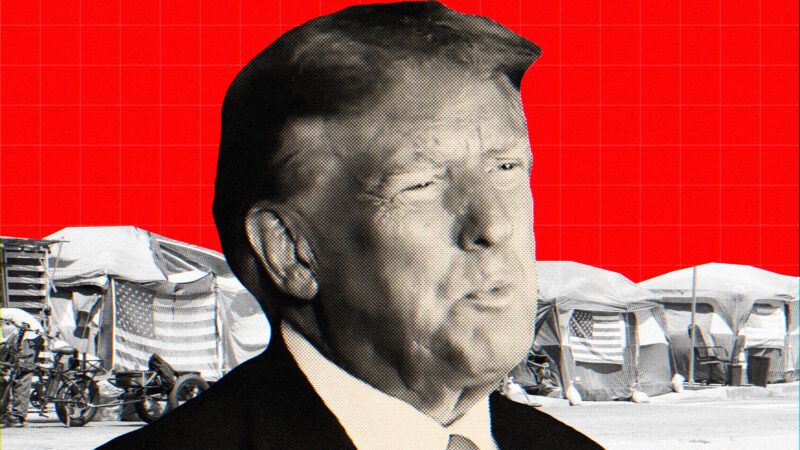Trump Advocates Mass Incarceration, 'Tent Cities' To Address Homelessness
The plan is unlikely to work, and the government already has a sordid recent history of funneling people into tent cities anyway.

On April 18, former President Donald Trump posted a video on his Truth Social account titled "Homelessness Plan." In it, Trump alleged that "the homeless, the drug-addicted, and the violent and dangerously deranged" had ruined America's cities, "turn[ing] every park and sidewalk into a place for them to squat and do drugs." He promised, "When I'm back in the White House, we will use every tool, lever, and authority" to "end the scourge of homelessness and make our cities clean and safe and beautiful once again."
How would he accomplish this? "Working with states, we will ban urban camping wherever possible…. We will then open up large parcels of inexpensive land; bring in doctors, psychiatrists, social workers, and drug rehab specialists; and create tent cities where the homeless can be relocated and their problems identified."
Treatment would be catered to individual need: "For those who have addictions, substance abuse, and common mental health problems, we will get them into treatment. And for those who are severely mentally ill and deeply disturbed, we will bring them back to mental institutions where they belong, with the goal of reintegrating them back into society once they are well enough to manage."
Trump's plan may sound magnanimous, but it's anything but. First off, there's no telling what such a plan, or for that matter any plan, would cost. Advocates often say that the Department of Housing and Urban Development (HUD) estimates $20 billion as the cost of ending homelessness in America. But that number was an informal, unverified estimate of the annual cost in 2012. And as Nan Roman, president and CEO of the National Alliance to End Homelessness, told VERIFY in 2021, "It's not so difficult to figure out what it would cost to end homelessness for everyone who is homeless tonight…. The problem is that more people BECOME homeless every day because they don't earn enough to pay for housing – we're 7 million housing units short to meet the needs of low-income people."
For his plan, Trump merely offered that "with all of the money we will save by ending mass unskilled migration, we will have a huge dividend" to put toward ending homelessness. But the canard that low-skilled immigrants "cost" the U.S. on balance is flawed, and if anything, we have too few.
Far from being beneficent, Trump's plan would force the homeless to either go along or go to jail: "Violators of these [urban camping] bans will be arrested," he clarified, "but they will be given the option to accept treatment and services if they're willing to be rehabilitated. Many of them don't want that, but we'll give them the option."
Unsurprisingly, one cannot simply ban the act of being homeless—at least, not without making life worse for those affected. According to the National Coalition for the Homeless, "The criminalization of homelessness is aimed at the visual ramifications of homelessness, not the root causes. Not only does it fail to address the underlying causes, but it further undermines the challenges of homelessness." For example: "A criminal record adds to the already difficult situation of finding employment, getting housing, or being eligible for certain services."
Past incarceration, Trump's plan would force people into either mandatory treatment or mental institutions, based on the government's determination of where they deserve to be. As Reason's Mike Riggs wrote in the May 2023 "Debate Issue:"
No policy model can eradicate homelessness. Not everyone on the street wants or can benefit from intervention. Involuntary commitment, even for the short, multiday periods currently allowed under most state laws, often exacerbates feelings of paranoia. Holding patients indefinitely turns them into prisoners. The only comprehensive solution—make homelessness illegal, and aggressively enforce that law—would be unconstitutional and barbaric.
But let's imagine that Trump's plan is implemented exactly as envisioned, and a significant portion of the more than 500,000 people experiencing homelessness are funneled into open-air tent cities. When the federal government set up shelters for unaccompanied minors who came across the southern border, conditions in the facilities were horrid. In one such shelter at Fort Bliss near El Paso, Texas, thousands of children and teenagers were housed in outdoor tents. Whistleblowers detailed unsanitary conditions and unmet medical needs.
Homelessness is a complex problem with numerous causes, and it stands to reason that a solution would be multipronged as well. This week, Reason's Liz Wolfe reported on the different policies pursued by Texas and California. Needless to say, any serious proposal for ending homelessness should be more complicated than simply criminalizing the act of being homeless.


Show Comments (106)